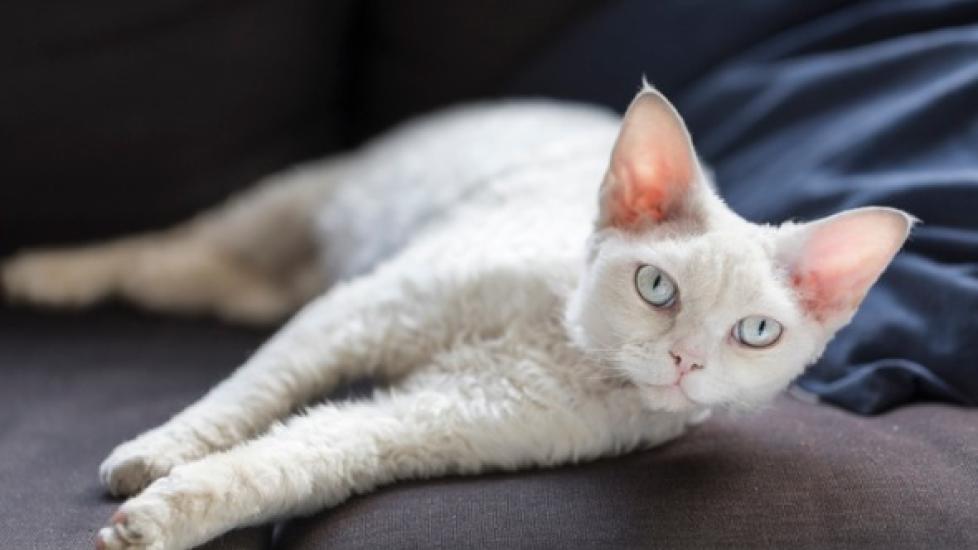Why Is My Cat Losing Weight?
Reviewed and updated for accuracy on November 8, 2019 by Dr. Liz Bales, VMD
It’s not always easy to detect weight loss in your cat. The fluff of fur covering most cats can serve as camouflage for weight loss until there is a big change.
Unintentional weight loss in cats can be a cause for concern. If you weren’t trying to help your cat lose weight, and especially if your cat is a senior, there might be a health issue to blame.
The causes of unintentional weight loss in cats range from simple lifestyle changes to serious illness. Any noticeable weight loss in your cat warrants a visit to your veterinarian to rule out serious health conditions. They will be able to run the necessary tests to determine what might be at the root of the problem.
Here are some possible reasons why your cat is losing weight and what you should do about it.
Reasons Your Cat Might Be Losing Weight
Below is a list of a few common causes of weight loss in cats.
Not Getting Enough Food
Sometimes, your cat is eating less than you think.
Do you have another cat or dog in the house? Additional pets in your home could be eating your cat’s food or obstructing your cat’s access to their food bowl.
Or did you recently change brands of food? The calorie content in a cup of food can vary greatly from one brand to another.
Is the food dish up high on a counter? Your cat could be experiencing pain from arthritis that is making it difficult to jump up to where the food dish is.
Your veterinarian can help you determine if there are obstacles in your home that are preventing your cat from getting enough food.
Intestinal Parasites
Intestinal parasites are very common in cats and can lead to weight loss if left untreated.
Pregnant mothers can give their kittens parasites, and they can also pass parasites through their milk when they are nursing. Cats can also get parasites from hunting and eating prey, or even by walking through contaminated grass and dirt and then grooming.
Your vet can examine your cat’s feces to determine if he is carrying parasites that might be causing weight loss.
If parasites are the cause, a simple dewormer, directed at the appropriate parasite, can put your cat back on the road to a healthy weight.
Feline Diabetes
Diabetes is very common in cats and will require immediate veterinary care and ongoing treatment.
In addition to unexplained weight loss, diabetic cats typically drink an abnormally large amount of water and urinate large volumes as well.
Overtime, without treatment, diabetes is a fatal condition.
If your vet suspects diabetes, they will likely take blood and urine samples to confirm the diagnosis. Successful treatment involves diet changes and often insulin.
Feline Hyperthyroidism
Cats over 8 years old are at risk for hyperthyroidism.
The thyroid is a butterfly-shaped organ that is located in the throat. It produces hormones that perform many functions, including regulating the body’s metabolism.
When a cat becomes hyperthyroid, their metabolism goes into overdrive—they lose weight, are ravenously hungry all of the time, have a very high heart rate, and often meow at night and have trouble sleeping. They may also drink a lot of water and urinate large amounts.
Your vet will do bloodwork to see if this is the cause of the weight loss.
Treatment of hyperthyroidism involves controlling the thyroid gland, either with medicine, special food or inpatient radioactive iodine treatment. Your vet will guide you in choosing the best treatment.
Feline Viral Disease
FIP, FeLV and FIV are viral diseases in cats. These viruses have different causes and possible therapies, but weight loss is a common symptom of all three.
If your vet suspects that a virus is the cause of your cat’s weight loss, they may perform blood tests and possibly more tests to determine if one of these viruses is the cause.
If a diagnosis is made, management and treatment will be based on the symptoms your cat is showing.
Feline Kidney Disease
Feline kidney disease can also lead to weight loss in your cat.
To determine if kidney disease is the cause of your cat’s weight loss, your vet will do bloodwork and a urinalysis.
Treatment may include prescription food, medicine and even sterile fluids that your vet can teach you to administer at home on a regular basis.
Feline Cancer
Many different forms of cancer can cause weight loss.
The diagnosis and treatment plan will vary depending on the kind and stage of cancer suspected. Your vet might do some or all of the following to confirm a diagnosis:
-
Bloodwork
-
Urinalysis
-
X-rays
-
Ultrasound and/or biopsies
Always Discuss Cat Weight Loss With Your Veterinarian
Unintentional weight loss is a nonspecific sign that can have many causes. Anything short of a veterinary visit is just a guess.
If you notice that your cat is losing weight, you need to call the vet. Make the appointment now.
Your vet should have a documented weight from the last visit and can confirm the weight loss.
They will take a thorough history and do a complete physical exam. Based on those findings, your vet might recommend a fecal exam to check for intestinal parasites, and bloodwork to check for clues to get to the bottom of what is causing the weight loss.
Featured Image: iStock.com/Angela Kotsell
Health Tools
Not sure whether to see a vet?
Help us make PetMD better
Was this article helpful?
